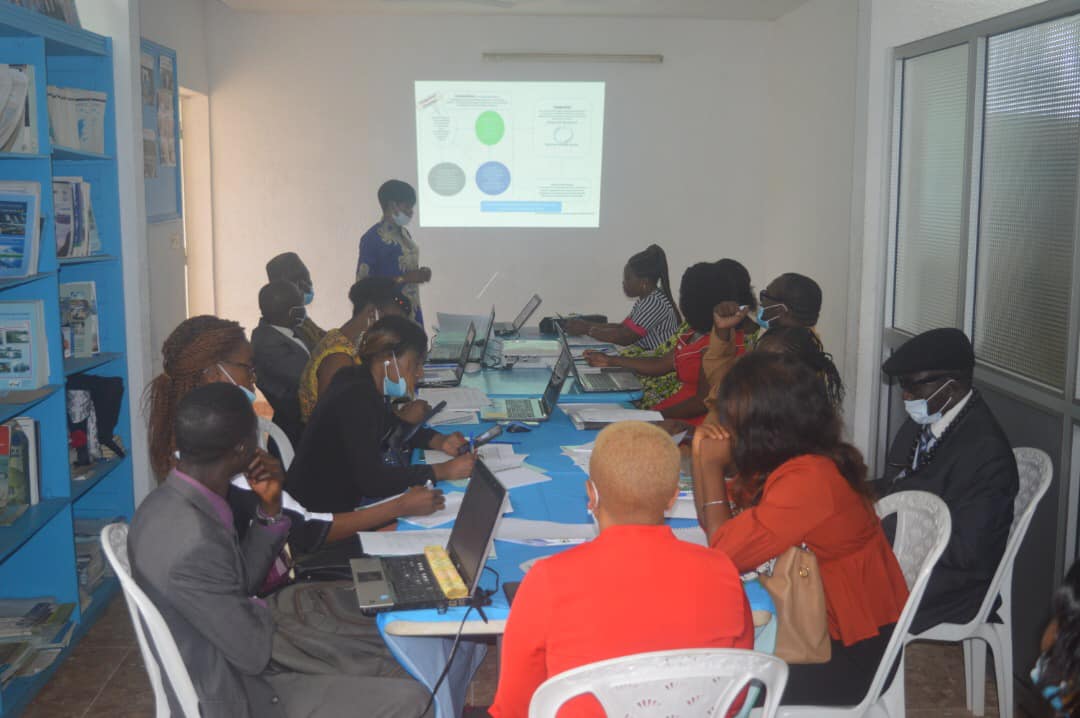The stakeholder workshop had as main objective to analyze the root causes and barriers of selected capacity gaps to inform on Gender Transformative Approach (GTA) to strengthening water security and climate resilience within the country.
The “learning event” which was facilitated by Cameroon Country Water Partnership (GWP-Cmr) and Includovate (a gender inclusive research firm contracted by GWP to conduct a gender survey in the WACDEP-G implementing countries) brought together over 20 participants selected from the gender survey respondents and some representatives of the water, gender and climate sector.

The workshop format focused on participation, engagement and collaboration through working group and plenary discussions and debriefings aiming to improve understanding of the scope and complexity of responding to gender inequalities through barriers analysis that focus on specific behavioral changes as well as identifying opportunities to address the status quo.
Two main debriefing presentations were made prior to the working group session: the WACDEP-G Program and its objectives by Murielle ELOUGA, WACDEP-G Programme Officer and the results of the survey conducted by Includovate on gender analysis in Cameroon by Alice Kaibowou, Includovate Consultant.
This survey which had as objective to identify gaps in the Gender Transformative Approach (GTA) within institutions revealed five major gaps;
- Institutional gaps
- The Gap in Project Implementation
- The Gap in Project Design and Implementation
- The targeting phase
- The Monitoring Gap Evaluation
The participants were split up into five working groups based on the gaps identified to brainstorm on the two group exercises: WACDEP-G Root Cause Analysis Exercise: Why and How and WACDEP-G Obstacles Analysis Exercise (focused on how these causes are manifested at the structural level).

Following the group discussions and exchange, the participants proposed recommendations on how to facilitate the implementation of the GTA in order to improve gender inclusion/equality in the water sector. These are:
- Organize Advocacy Sessions for decision-makers to take into account women's concerns;
- Capacity building for women through Training Workshops and Awareness campaigns;
- Sensitize public and Non-Governmental institutions on the need to take into account the GTA in the monitoring and evaluation of projects;
- Popularize good governance documents;
- Strengthen stakeholder cooperation.
The recommendations will be included in the final Includovate gender analysis report for Cameroon which will serve as a Project document guide to the WACDEP-G regional and country team. This learning exercise is an important step in WACDEP-G engagement and network building and also sets the stage for future collaboration with stakeholders in the implementation of the program as well as the promotion of a GTA in the country’s water sector.

About the Water, Climate, Development and Gender Program (WACDEP-G)
WACDEP-G is a program that emerged from the WACDEP program after recognizing the significance of gender inequality in water security and climate resilience in Africa. The new phase of the program (2020-2025), Water, Climate, Development and Gender Equality (WACDEP-G), will be implemented in 18 countries and 5 transboundary basins with the financial support from the Austrian Development Cooperation (ADA) within the framework of the African Water Investment Program (AIP). The overall objective of WACDEP-G is to transform gender inequalities at scale by promoting gender-transformative planning, decision-making and institutional development for climate resilient water investments in Africa. The ultimate goal is to achieve progress in gender equality by shaping investments in climate-resilient water security for 3.6 million people over 6 years, involving projects and programs amounting to about $1 billion investments from government and private sources.
The Program is structured around three main components:
- Gender-transformative change for implementation of climate-resilient water investments,
- Mobilising partnerships and building motivation, capabilities and opportunities for transforming structurally embedded unequal power relations,
- Agile learning from implementation of local pilots.
About the Africa Water Investment Program (AIP)
